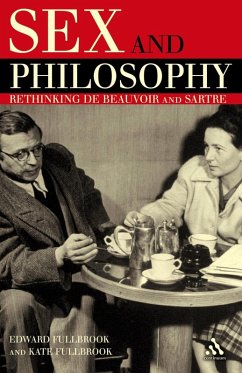From the author's introduction:
As the Sartre-Beauvoir story developed and became part of contemporary mythology, it was increasingly filtered through two presumptions regarding the nature of the partnership. One concerned sex, the other philosophy. The classic view of Beauvoir, encouraged by her own writing and by Sartre's acquiescence, has been one of Sartre as womanizer and Beauvoir as the patient, loyal female victim. The legend also consistently portrayed Beauvoir as the midwife of Sartre's philosophy rather than a thinker in her own right, encouraging the view that her philosophical writings were mere echoes of the thoughts of her man. But over the past 25 years big chunks of documentary evidence have become public which show that both of these traditional interpretations of the Sartre-Beauvoir story are profoundly false. It is now clear, as this book explains, that it was Beauvoir's demand for sexual freedom that dictated the open terms of their relationship and that it fell to Sartre at least as often as to Beauvoir to perform the role of midwife for the other's philosophy.
Jean-Paul Sartre and Simone de Beauvoir were two of the most brilliant, influential, and scandalous intellectuals of the 20th century. They are remembered as much for the lives they led as for their influence on the way we think. Their committed but notoriously open union created huge controversy in their lifetime. And even before their deaths they had become one of history's legendary couples, renowned for the passion, daring, humor and intellectual intensity of their relationship.
This fascinating book presents a biography of Sartre and de Beauvoir's relationship and offers some highly original theories relating to the extent of de Beauvoir's contribution to their shared ideas. Through a thorough examination of Sartre and de Beauvoir's major works, the authors present a compelling story of their romantic and intellectual relationships.
As the Sartre-Beauvoir story developed and became part of contemporary mythology, it was increasingly filtered through two presumptions regarding the nature of the partnership. One concerned sex, the other philosophy. The classic view of Beauvoir, encouraged by her own writing and by Sartre's acquiescence, has been one of Sartre as womanizer and Beauvoir as the patient, loyal female victim. The legend also consistently portrayed Beauvoir as the midwife of Sartre's philosophy rather than a thinker in her own right, encouraging the view that her philosophical writings were mere echoes of the thoughts of her man. But over the past 25 years big chunks of documentary evidence have become public which show that both of these traditional interpretations of the Sartre-Beauvoir story are profoundly false. It is now clear, as this book explains, that it was Beauvoir's demand for sexual freedom that dictated the open terms of their relationship and that it fell to Sartre at least as often as to Beauvoir to perform the role of midwife for the other's philosophy.
Jean-Paul Sartre and Simone de Beauvoir were two of the most brilliant, influential, and scandalous intellectuals of the 20th century. They are remembered as much for the lives they led as for their influence on the way we think. Their committed but notoriously open union created huge controversy in their lifetime. And even before their deaths they had become one of history's legendary couples, renowned for the passion, daring, humor and intellectual intensity of their relationship.
This fascinating book presents a biography of Sartre and de Beauvoir's relationship and offers some highly original theories relating to the extent of de Beauvoir's contribution to their shared ideas. Through a thorough examination of Sartre and de Beauvoir's major works, the authors present a compelling story of their romantic and intellectual relationships.









